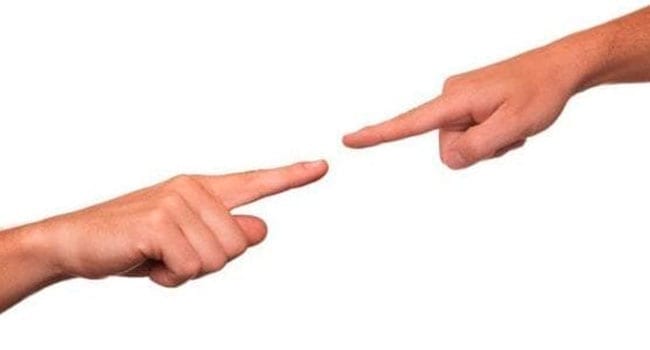 The breaking point for me was Pittsburgh. This murderous act of anti-Semitic horror, when combined with the relentless breakdown in social civility, has made me face an unpalatable truth: something has gone very wrong with modern society.
The breaking point for me was Pittsburgh. This murderous act of anti-Semitic horror, when combined with the relentless breakdown in social civility, has made me face an unpalatable truth: something has gone very wrong with modern society.
Our entire civilization is speeding to toward fragmentation and decay – Brexit, Donald Trump, warring political partisanship, rising populism.
There are many reasons for this but all these forces are fuelled at depth by identity politics, a ‘progressive’ ideology that seems hell bent on disintegration.
I appreciate that conservatives have been saying this for years. What’s different for me is that I basically align with the goals of progressivism. I’ve always been a champion for greater equality. I strongly support a more inclusive and compassionate society that starts with mutual respect and builds upon a foundation of equal opportunity.
But I’m a bit old fashioned – you might call me a 20th century liberal. I’m certainly out of sync with 21st century progressivism.
Liberalism and the idea of progress have a long pedigree. In their modern forms, they date back to the Enlightenment in the 18th century, with its abandonment of medieval superstition and a renewed emphasis on reason and scientific truth.
Liberalism as a creed has evolved considerably over the ages and in the 20th century it was all about eliminating structural inequality. Liberals focused on breaking down irrational social barriers, creating more opportunity for working people, for women and other minorities. And after the horrors of Nazism and their murderous race hatred, liberals worked hard to break down social barriers and create a truly multi-ethnic society.
Many modern progressives would say they’re working to achieve the same goals, but simply expanding upon them to establish greater respect for LGBTQ communities and the environment.
But on reflection, I realized there’s much more going on here. A major philosophical fissure has opened between modern progressives and old-school liberalism.
The differences centre on two questions: why inequality exists in the first place and who’s to blame for it?
Simply put, 20th century liberals accepted that human society has been riddled with oppression, bitter class divisions and inequality. However, liberals viewed modern western society as possessing unique qualities. It alone amongst global civilizations embraced the goal of equality, unleashing progressive forces conditioned by the Enlightenment ideals of liberty, justice and peace.
For 20th century liberals, western society was positively dynamic, the very means of advancing the progressive agenda.
On the other hand, 21st century progressives believe essentially the opposite. Inequality, in their view, is deliberate. More importantly, they’ve internalized the Romantic notion that liberty is the natural condition of humanity in the absence of restraint.
In other words, the very presence of inequality is proof of social oppression. For example, unequal gender representation in the workplace or in the corridors of power is proof of a male conspiracy; for progressives, gender inequality in these social arenas wouldn’t exist but for the deliberate repression of women by society.
Regrettably, in the modern progressive mind, western society is not the source of liberation, it’s the agent of oppression.
This ideological reversal conditions modern progressives to blame society for all real and perceived ills. One tragic consequence, apart from a constant stream of official apologies, is the loss of any concept of social unity.
It’s no surprise that modern progressives champion identity politics, the idea that society is not a largely benevolent whole advancing toward a better place but a war between identifiable victims (women, LGBTQ communities, Indigenous peoples, etc.) and an oppressive society at large.
The consequences are obvious, particularly the growth of intolerance. For those who accept the progressive logic, there are no legitimate arguments in favour of traditional values. Hence the demonization of any ideas contradicting the central premise that society is to blame.
The violent forces of counter-revolution are also inevitable and we see them growing stronger every day. The rise of Trump-style populism and the explosion of nasty ethnic violence can be traced directly to the adoption of white identity politics by angry minorities.
As an old-school liberal, I lament the erosion of social cohesion. Once lost, it’s difficult if not impossible to recover. I also accept that inequality exists and that we must work hard to eliminate it.
But if we are to avoid a violent future, we must resist the politics of blame and advance forward together on the liberal trajectory that the West has been championing for centuries.
Robert McGarvey is an economic historian and former managing director of Merlin Consulting, a London, U.K.-based consulting firm. Robert’s most recent book is Futuromics: A Guide to Thriving in Capitalism’s Third Wave.
Robert is a Troy Media Thought Leader. Why aren’t you?
For interview requests, click here. You must be a Troy Media Marketplace media subscriber to access our Sourcebook.
The views, opinions and positions expressed by columnists and contributors are the author’s alone. They do not inherently or expressly reflect the views, opinions and/or positions of our publication.

